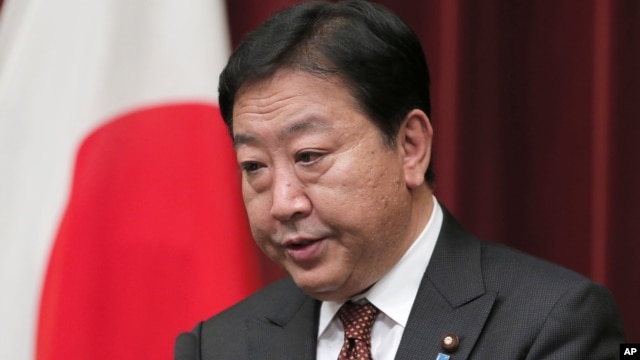
Japanese Prime Minister Yoshihiko Noda speaks during a press conference at his official residence in Tokyo, August 24, 2012.
TOKYO — Japan's top government officials and lawmakers are continuing to turn up the heat on two neighboring countries with claims on islands that Japan considers its own.
While calling on South Korea to respond to the territorial dispute in a wise and cautious manner, Japanese Prime Minister Yoshihiko Noda's remarks at a Tokyo news conference Friday evening are likely to do little to ease rising diplomatic tensions with both Seoul and Beijing.
Noda tells reporters Japan will strengthen measures to secure its surrounding waters.
In a tough 10 minute opening statement, the Japanese prime minister asserted his country's territorial claims noting while it may be 61st in land size Japan's expansive maritime waters make it the world's sixth biggest sea power. When the depths of those waters are also taken into consideration, Noda asserts, Japan is number four.
Such boasts from a Japanese leader have been rare since the country's unconditional surrender in 1945. The defeat brought to an end the Pacific War and instantly eradicated Japan's half-century of brutal colonial expansionism.
Hours before Noda's news conference, South Korea lodged a formal diplomatic protest with Japan after both the prime minister and the foreign minister characterized South Korea's control of a disputed small island territory as an “illegal occupation”
South Korea's protest calls “unjustified” the Japanese claim to rocks nearly equidistant between the Korean peninsula and Japan's main island of Honshu.
Known internationally as the Liancourt Rocks, they cover a total area of less than one-fifth of a square kilometer. South Korea calls the territory Dokdo which the Japanese also claim them under the name of Takeshima.
South Korea's president has also raised Japanese emotions by using what the Japanese perceive as course language directed at Emperor Akihito.
Lee, earlier this month, said it would not be possible for the Japanese monarch to visit South Korea unless he offers a heartfelt apology for Japan's past colonization of the Korean peninsula. The South Korean president contended that a repeat of the Emperor's 1990 expression of “deepest regrets” would not be adequate.
The escalation of domestic tensions is spilling into economic relations, as well.
Japanese finance minister Jun Azumi acknowledges the tensions are influencing decisions on whether Tokyo will extend a currency swap arrangement with Seoul as well as Japanese purchases of South Korean government debt.
In a symbolic but rare action, Japan's parliament Friday adopted resolutions calling South Korea's recent actions and a successful landing by Chinese activists on a Japanese-held island “extremely regrettable.”
The Japan-China feud involves small islands in the East China Sea known as Senkaku in Japanese and Diaoyu in Chinese.
In response to the landing by Hong Kong-based activists, the right-wing governor of Tokyo, Shintaro Ishihara, is requesting permission for the metropolitan government to sail to the islands. Past requests have been refused by the central government but Prime Minister Noda says no decision has yet been made on whether the Tokyo request will be granted. |
|
